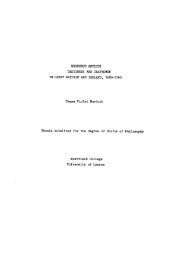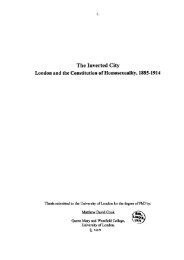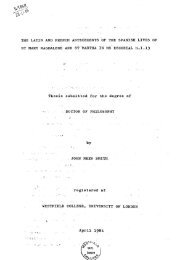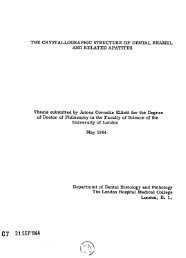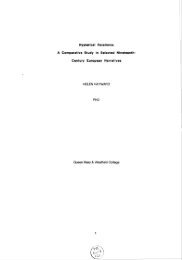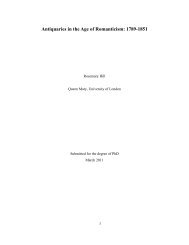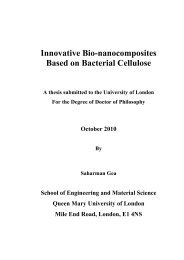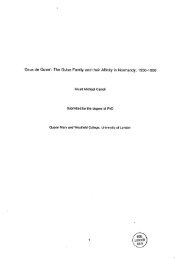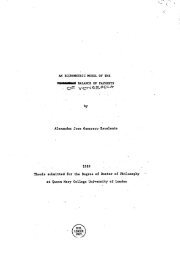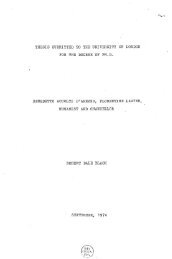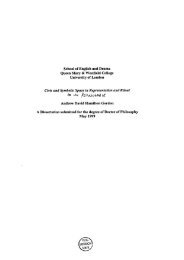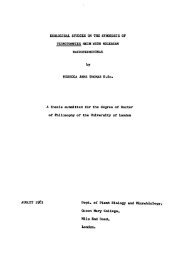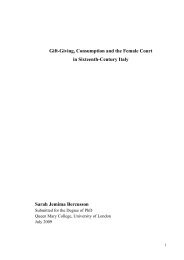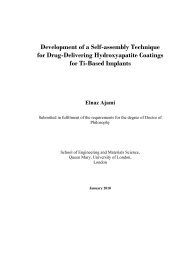- Page 1 and 2: HABIT AND SPONTANEITY IN SAMUEL BEC
- Page 3 and 4: 3 Ne parlons pas de la critique prc
- Page 5 and 6: CHAPTER IV MURPHY CHAPTER V N= CONC
- Page 7 and 8: INTRO=ICN 7 In this study I will be
- Page 9 and 10: 9 There is of course no easy transi
- Page 11 and 12: 11 17 written before the great crea
- Page 13 and 14: 13 The creature of habit experience
- Page 15 and 16: is -particularly valuable in its di
- Page 17 and 18: '117 ideas related to his am aesthe
- Page 19 and 20: 19 the unborn infant and the lifele
- Page 21 and 22: 21' In the first, group - both chro
- Page 23 and 24: goes on to suggest that "Beckett hi
- Page 25 and 26: 25 human reason that can be seen to
- Page 27 and 28: 2N7 neglected elerrx--nts in Becket
- Page 29 and 30: 29 "- In another interview,, this o
- Page 31 and 32: 31 ý, . The shape of Augustine's d
- Page 33 and 34: and: 33' I think that . anyone nowa
- Page 35 and 36: present, and about our possibilitie
- Page 37 and 38: 37 After Beckett's discussion, in "
- Page 39 and 40: 39 the past in ronochrorre. The i1p
- Page 41: 41 view in Godot -that "they give b
- Page 45 and 46: 45 4 discussing his own stable conc
- Page 47 and 48: seems to thi . nk it should be 32 4
- Page 49 and 50: 49 % thing and in flux. In Proust B
- Page 51 and 52: 51 and ui)en he then leaves the lib
- Page 53 and 54: " 53 of the coments nade here diffe
- Page 55 and 56: 't 55 Va-en Beckett writes, again i
- Page 57 and 58: 57-k about or discuss these two un-
- Page 59 and 60: 59. This use of opposites is most c
- Page 61 and 62: 61 " de son abandon, le chemin des
- Page 63 and 64: w 63 % ability, to recreate any rel
- Page 65 and 66: 65 -it This list can go on: silence
- Page 67 and 68: 67 inpossible to talk about this "c
- Page 69 and 70: 69 The Dives-Lazarus symbiosis, as
- Page 71 and 72: 71 awareness. However, as soon as o
- Page 73 and 74: 73 expressed in the early articles
- Page 75 and 76: 75 opening our eyes, I of spontaneo
- Page 77 and 78: our eyes and see the n-ess. " 55 77
- Page 79 and 80: 79 instead of allowing it in %, A--
- Page 81 and 82: are derived from the fourth canto o
- Page 83 and 84: 83, terrm , but we can It sum them
- Page 85 and 86: 85 that will ensure that hb will sp
- Page 87 and 88: 87 boni and the unborn and the neve
- Page 89 and 90: 69 habit to die., The first of thes
- Page 91 and 92: 91. trace, nothing remotely like an
- Page 93 and 94:
93 The main question I am asking in
- Page 95 and 96:
95,.. do riot exhaust the Sn-craldi
- Page 97 and 98:
. %97 concludes his description of
- Page 99 and 100:
99 N peace to the land of everlasti
- Page 101 and 102:
101 Menever it is a question of fac
- Page 103 and 104:
103 %-'is the passional imvem-nts o
- Page 105 and 106:
we can conclude with the Alba's tir
- Page 107 and 108:
107 104) to manipulate his characte
- Page 109 and 110:
109 This indicates that Belaajua's
- Page 111 and 112:
ill animal post coitum triste est.
- Page 113 and 114:
113, there are also several indicat
- Page 115 and 116:
115ý Swift... he kep a rrotte, in
- Page 117 and 118:
117. reluctance to open his eyes to
- Page 119 and 120:
119 , kind of corm-ent is rrk-Ae in
- Page 121 and 122:
121ý aftermath of Belacquals own d
- Page 123 and 124:
123 is the technical nam for the lo
- Page 125 and 126:
125 intact. For the remainder of th
- Page 127 and 128:
1: 2 7 of the individual utio had l
- Page 129 and 130:
129, conditions at certain stages i
- Page 131 and 132:
131' story of the outcast Cain. The
- Page 133 and 134:
133 This explanation is good enough
- Page 135 and 136:
135 That Was SCMthing. 11 P2.13) ac
- Page 137 and 138:
137 I to the pub where he is knmnto
- Page 139 and 140:
139 but he will not be at a loss: h
- Page 141 and 142:
141 (Inferno, XX, 28; NP. 18), 'her
- Page 143 and 144:
143 "Suddenly he saw -the creature
- Page 145 and 146:
145 need for the comfort and peace
- Page 147 and 148:
147 glean anything further about th
- Page 149 and 150:
". 49 and of the object, which mean
- Page 151 and 152:
151 UP- subject with the cbject of
- Page 153 and 154:
153 tin-e that marphy is found, Nea
- Page 155 and 156:
conversatim 155 Neary had with Výy
- Page 157 and 158:
157 Mien Cooper lets the others kno
- Page 159 and 160:
f5 (. ) /her, 7" (M. 55), Celia pre
- Page 161 and 162:
161 down almst to a halt: the only
- Page 163 and 164:
1P3 It would be tidier to conclude
- Page 165 and 166:
165 laws. Divine, 12 supernatural,
- Page 167 and 168:
I 1ý7 There are, however, certain
- Page 169 and 170:
169 Celia and the stars are part of
- Page 171 and 172:
171 Celia and the stars are only a
- Page 173 and 174:
113 certainly something spontaneous
- Page 175 and 176:
175 the torpor 'of Murphy 's com-mm
- Page 177 and 178:
177 "all the rrost deadly weapons o
- Page 179 and 180:
179 he escaped by lapsing "into con
- Page 181 and 182:
ibi psychiatrists on behalf of the
- Page 183 and 184:
183 confom to the idea he has of hi
- Page 185 and 186:
185 is-worried when Mirphy does not
- Page 187 and 188:
187 khmphy is not indifferent to th
- Page 189 and 190:
189 tional,. and as his garm progre
- Page 191 and 192:
191 At thý end nxrphy is reduocd t
- Page 193 and 194:
4 193 Endon's equanimity (how could
- Page 195 and 196:
195 The nothingness Murphy wullows
- Page 197 and 198:
197 This passage confirms the irpre
- Page 199 and 200:
199 It. may be suggested that his h
- Page 201 and 202:
201 two parts of the uhole that is
- Page 203 and 204:
i only to refer to wbat in Watt are
- Page 205 and 206:
Watt'begins and ends in the sensibl
- Page 207 and 208:
number... yOu are mistaken. I may b
- Page 209 and 210:
209 that is knowable - Ahich is to
- Page 211 and 212:
1% 211 does die and is replaced by
- Page 213 and 214:
213 and wheeled it to the other. Th
- Page 215 and 216:
statemnt: 4 215 He wondered what Ar
- Page 217 and 218:
1% 217 Arsene explains the circumst
- Page 219 and 220:
ft 219 descend, so munt, rung by ru
- Page 221 and 222:
They are alike in that they interru
- Page 223 and 224:
223 himself unsuccessful when he fa
- Page 225 and 226:
225 to Sam (W 76) ., Thus towards t
- Page 227 and 228:
227 Watt's, to get out of bed and g
- Page 229 and 230:
229 Watt decides that the picture i
- Page 231 and 232:
231 By tuming the tuvieldiness of n
- Page 233 and 234:
233 habit cannot foresee. Watt has
- Page 235 and 236:
235 The morent passes. "One day the
- Page 237 and 238:
237 that sore - or even all - of th
- Page 239 and 240:
"This constant tension of scre of h
- Page 241 and 242:
241 It is not , of course, in fact
- Page 243 and 244:
new term of relation. 243 What this
- Page 245 and 246:
245 and he continues to use his fac
- Page 247 and 248:
247 admits that he hasn't quite fin
- Page 249 and 250:
249 It is this process of coirdng t
- Page 251 and 252:
of the night 251 (W. 203). Ewen in
- Page 253 and 254:
253 the inadequacy of satisfying se
- Page 255 and 256:
255 This disparity seeirr. to have
- Page 257 and 258:
257 almost exactly Watt's situation
- Page 259 and 260:
Serenity 259 Maen Watt was on the g
- Page 261 and 262:
On the Road ard in the Station 261
- Page 263 and 264:
263 painful and uncertain, was less
- Page 265 and 266:
265 corrpletely, lost his indiffere
- Page 267 and 268:
267 when he was well on his way to
- Page 269 and 270:
269 That- there should be even a su
- Page 271 and 272:
271 fines of his habit. Watt's mams
- Page 273 and 274:
273 Sam's senses are now "sharpened
- Page 275 and 276:
CONCLUSICN 275 It is possible to vi
- Page 277 and 278:
277 every turn, his attenpts at exp
- Page 279 and 280:
279 worlds are,, however, contrary
- Page 281 and 282:
281 sensations that he knows he mus
- Page 283 and 284:
283 actually takes place. If he can
- Page 285 and 286:
285 or will it mean a new road forw
- Page 287 and 288:
287 an orderly miverse wherein ever
- Page 289 and 290:
Poems in Englis . 289 londm: Calder
- Page 291 and 292:
Finney,, Brian H. 1973. 291 Since H
- Page 293 and 294:
293 Di9genes Ladrtius. Lives and op



